|
| |
From 18 February 2005, the UK Government
have banned hunting with hounds in England and Wales. Hunting, in many forms,
has been practised by humanity for thousands of years, so banning it now might
seem somewhat odd. The opinion of the country is divided on the subject. What is
the truth?
The first question is the most
fundamental: is hunting right or wrong? Many people say it is wrong. But this is
because they are answering the wrong question. In fact there is no answer,
because it depends on what is being hunted, how, and why.
What: If the removal of the hunted
animal in the affected quantity from the local ecosystem would upset the balance
of that system, or jeopardise the natural existence of that species locally,
then it would be wrong to hunt it. For example, hunting of endangered gorillas
in Africa for food cannot ever be right, not only because gorillas are among our
nearest relatives, but also because it is a threatened species.
How: If the hunting causes
unnecessary cruelty, it is wrong. For example, bear-baiting was not strictly
hunting, but it consisted primarily of gratuitous cruelty to the bear, goading
it to fury. Bear-baiting was rightly banned centuries ago.
Why: Good reasons for hunting
include for food, for pest control, or to restore a balance of nature which has
been upset by human interference. Hunting purely for the fun of pestering a wild
animal would be a bad reason.
So, let us apply these tests to the four
main forms of hunting which have been banned: fox hunting, hare hunting, mink
hunting and stag hunting.
Fox hunting in England is normally
conducted by a pack of hounds, controlled by a huntsman, whippers-in and Hunt
masters who are normally on horseback. The hounds pick up the scent of a fox and
follow it until they find the quarry, which is then either killed by the hounds
or flushed by them to people waiting with guns. Many people follow the hunts,
both on horseback and by car (and sometimes on foot). Foxes are abundant in
England and Wales, and hunting thins out a relatively small proportion of their
numbers, so the `what' test is easily met. The chase would of course cause
stress to the fox, but little different from the stresses a wild predator would
normally face in its life, and no different to being hunted by a natural
predator of the fox (such as wolves, which are now extinct in Britain). The
death is either caused by a single clean shot or a swift bite to break the fox's
back, either of which is quicker, cleaner and more humane than alternatives such
as trapping, poisoning, gassing or long-range shooting (which too often tends to
wound rather than kill). So the `how' test is met. Finally the `why': foxes
cause serious damage to livestock such as lambs, chickens, ducks and geese.
Their numbers are higher than their natural level because of human activity:
elimination of their only predator (wolves), and provision of food either in
rubbish tips, town refuse or farmers' livestock have all contributed to rises in
fox numbers. Therefore it is our duty as responsible stewards of the environment
to redress the balance and thin out fox numbers closer to a balanced level. In
my view therefore, it is clear that fox hunting meets all the tests of
acceptability.
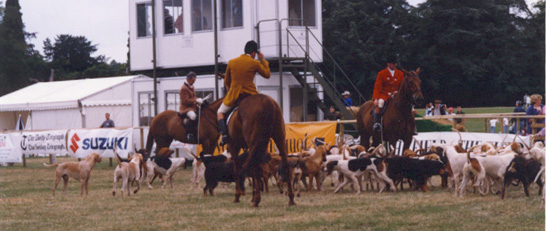 |
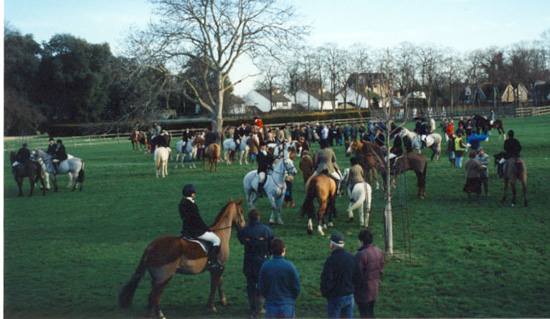 |
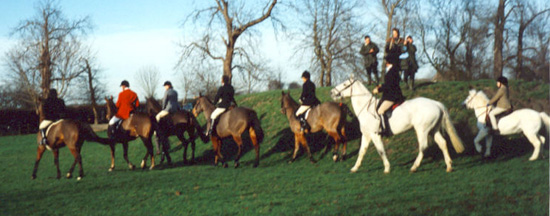 |
| Foxhounds at
the Game Fair, Blenheim, Summer 2002 |
Meet of the Cambridgeshire
Foxhounds, Ashwell, New Year 1998 |
Cambridgeshire
Foxhounds moving off |
Hare hunting is also conducted by a pack
of hounds, either beagles (small hounds managed and followed on foot), bassets
(also small hounds but with a different balance of skills from beagles), or
harriers (larger hounds similar to fox-hounds and generally followed on
horseback). The `what' and `how' arguments are the same as for the fox. The
`why' is mainly about numbers; hares cause damage to growing crops (their
favourite food is the tender young shoots of wheat or barley), though the damage
is fairly small compared to other problems like disease or rabbits. Most
importantly, because most of Britain has been planted with hare-food and most of
their natural predators have been eliminated or decimated, hare numbers are
higher than their natural level. Although the arguments are not as strong as for
fox hunting, hare hunting still passes the test.
 |
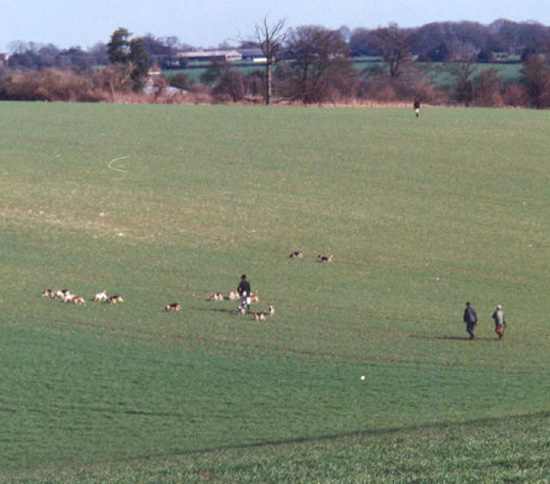 |
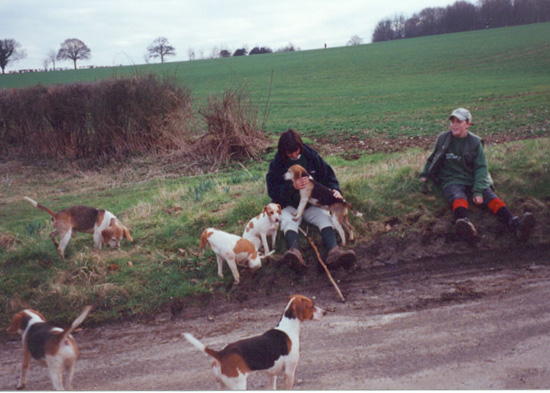 |
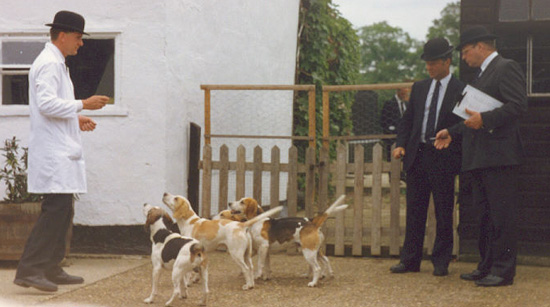 |
| South Herts
Beagles meet at Melchbourne, late 1990s |
Casting for the quarry |
End of a tiring day |
Trinity Foot
puppy show, 1980s |
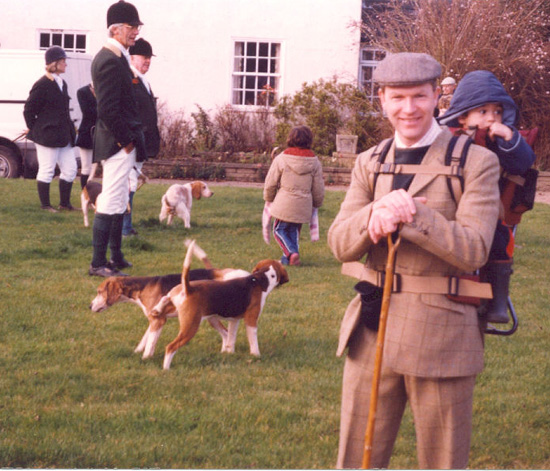 |
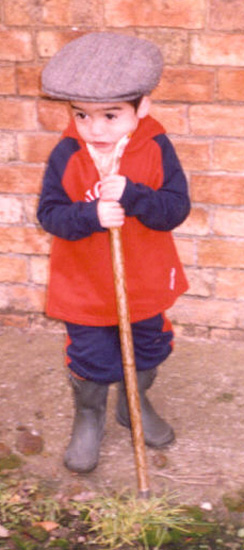 |
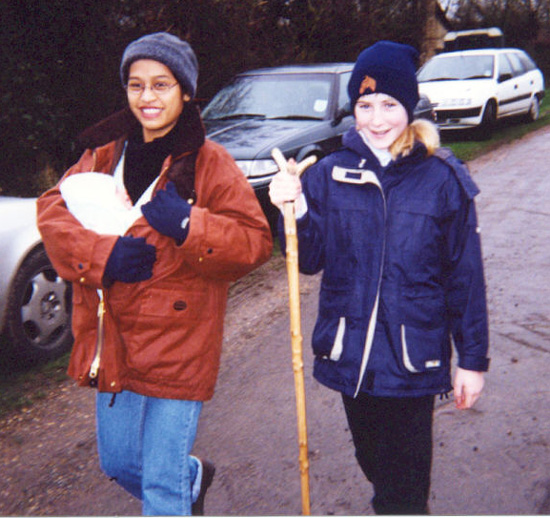 |
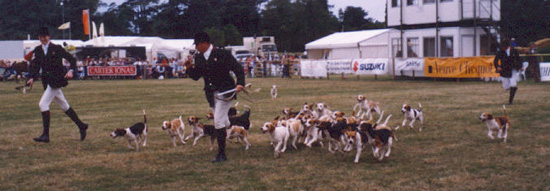 |
| North Bucks
Beagles meet, Winter 2004 |
Pensive hunter! |
Beagling is always
cheerful, even when very cold and wet! Note two month old hunter!
New Year 2002 |
Beagles at the
Game Fair, Blenheim, Summer 2002 |
Mink hunting is the easiest to justify. It
is conducted by a pack of hounds, normally hunting along a river bank (where
mink make their homes), and followed on foot through difficult country. Because
mink are legally recognised as vermin, it is conducted in the summer, the aim
being not to control their numbers but to reduce, or if possible eliminate,
them; in other forms of hunting, no hunting is permitted during the breeding
season because it would jeopardise the natural balance. The `what' argument is
different from foxes or hares: mink are not a native species to Great Britain.
They were brought in for fur farms, mostly in the early 20th century. Many
escaped, and formed breeding populations. Others were released by well-meaning
activists who objected to the cruelty of breeding animals for their fur.
Unfortunately those activists failed to consider that mink are an aggressive
predator to which British native wildlife has not adapted defences. The result
has been the almost total extinction of water voles, dramatic declines in river
birds such as kingfishers, coot, moorhen and mallard, and severe damage to
farmers' chickens. They are also supremely adaptable, being able to run, swim
and climb trees with equal ease. The `why' argument follows from this: the
balance of nature can only be restored by eradicating mink from Britain. They
are not threatened in their native habitat in northern Europe or America. The
`how' argument is the same as for foxes or hares, with the additional force that
the main alternative (trapping) has a high probability of getting the wrong
thing; trapping an otter or a water vole, for example, would be a tragic own
goal.
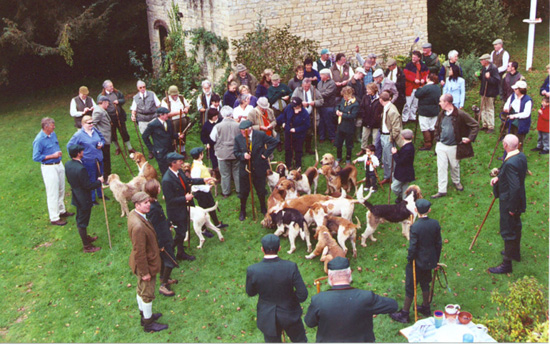 |
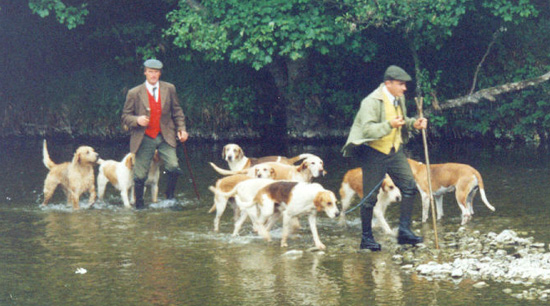 |
 |
|
Northamptonshire Mink Hounds meet, September 2004 |
On the River
Tweed, Summer 1999 |
Searching for a mink .... |
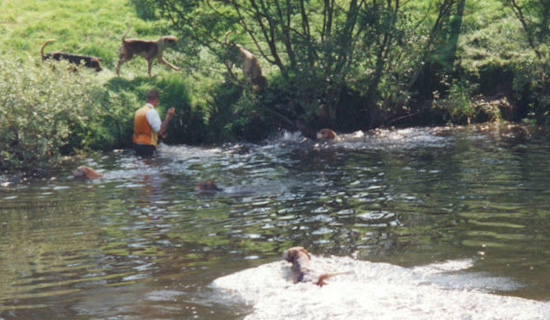 |
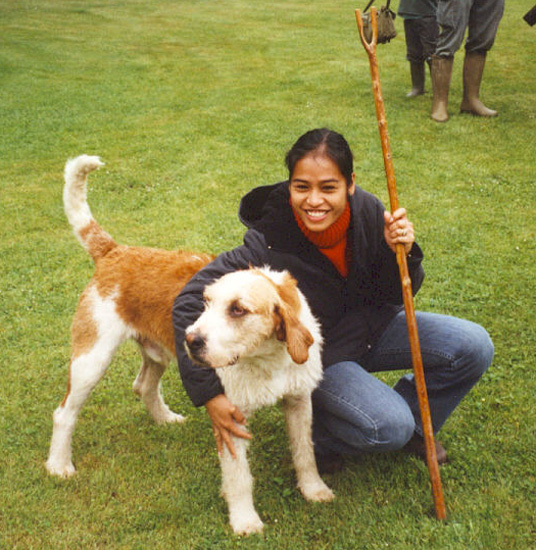 |
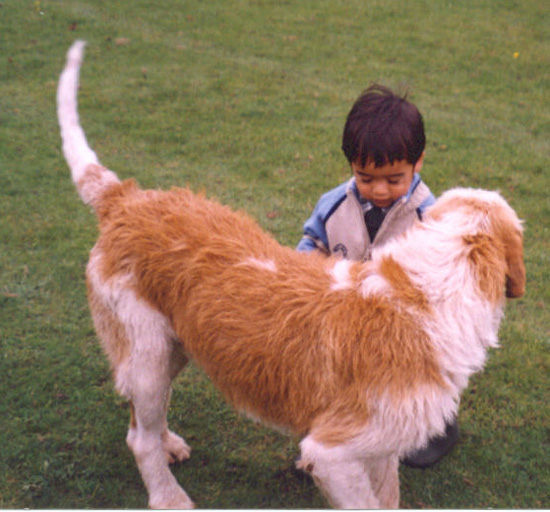 |
| .... and
finding one! As often happens, among a tangle of roots on the river
bank. |
Ivy & friend
(Carver) |
Charles with Carver |
 |
 |
 |
| Young mink
hunter, properly dressed! |
Hounds still
eager after a long journey in the trailer (Summer 1999) |
Mink Hound show, Ragley
Hall, 1990s |
Stag hunting arouses some of the stronger
passions in the hunting debate. It is one of the most ancient forms of hunting.
A particular stag is pre-selected for hunting. Specially trained hounds separate
it from the rest of the herd, after which the main pack hunt it in a similar way
to foxes. Once the stag is brought to bay, it is always shot; the meat is eaten.
The `what' argument is the same as for hares and foxes. The `how' argument has
caused considerable scientific controversy, with some scientists claiming that
the levels of stress the stag undergoes are well in excess of anything it would
encounter naturally, others claiming that it is entirely within natural bounds.
One of the main anxieties is the duration of the hunt compared with hunts by
natural predators, such as wolves or big cats, none of which survive in Britain
today. Although these controversies have not definitively been settled, the
latest scientific evidence is on the side of hunting causing similar stresses to
natural predation, and therefore comes down on the side of supporting hunting.
Finally, the `why' question is simple: deer numbers need controlling because
otherwise the deer population would increase to a level where the deer would
start suffering from diseases and have difficulty finding food. This was
graphically illustrated recently when a park run by animal welfare activists for
rescued deer passed the critical population point, and many of the animals
suffered cruelly as a result. Stag hunting is therefore a response to our moral
duty to manage the environment in a responsible and balanced way, to redress the
imbalance caused by our eliminating the stag's natural predators.
So, all the forms of hunting which have
been banned can be justified objectively. These facts were borne out by the UK
Government's own independent report, the Burns report (the full test of which
can be found online at www.huntinginquiry.gov.uk/mainsections/report.pdf). So
why did the government ban it?
The sad truth is that it has been banned
because of ignorance, bigotry and prejudice on the part of the UK's elected
parliament.
The UK currently has a Labour government.
Many members of parliament think that hunting is a pastime of rich, aristocratic
people. Many Labour MPs are unreconstructed socialists who viscerally hate such
people and would do anything to bring them down, or score off them in some way.
Of course, there are some rich people who hunt. Hunting has to take place over
land, with the landowners' permission, and owning land often makes people rich;
the landowners often join in. This is scarcely surprising: it is their land and
they are acting as responsible stewards of it. And some of these landowners are
aristocratic. But the vast majority of people who hunt are ordinary working
people for whom that is their hobby. Most hunts are closer to a true classless
society: people of all backgrounds and all social classes mixing together as
equals on the hunting field. The few hunts which are snobbish are a tiny
minority. If the anti-hunting MPs had ever been to a hunt, they would have seen
this for themselves. (I had never hunted until I was 20 and, until then, held no
strong views for or against. The views I am expressing in this page are the
result of having been to several hunts and observed what actually happens).
People on horseback are naturally higher
off the ground than pedestrians, so there might be a psychological factor in
mounted hunters unintentionally intimidating others, or the onlookers feeling
`looked down on'. But this isn't a social issue; it's just the size God made a
horse. And the fact that many people spend all their spare income, down to the
last penny, on keeping a horse for hunting seems to cut no ice with MPs whose
minds are closed on the issue.
The fact that hunting rats and rabbits is
exempt from the ban is telling; it reveals that claims that the ban is motivated
primarily on animal welfare benefits are a sham. (The Burns Report also
demolishes this claim comprehensively).
Another argument is that, though there
might need to be some pest control, any killing of animals is regrettable and it
is morally unacceptable for people to enjoy doing it. This argument would have
force if that was what people enjoyed about hunting, but it isn't. For most
people it is the skill of the hounds, the partnership between hunter, hound (and
horse if involved), and the thrill of the chase. As well as the healthy exercise
in the open air, and the enjoyment of the splendid British countryside. The kill
itself is a utilitarian aspect which is of only utilitarian interest.
A third argument used against hunting is
that it is antiquated, outdated; an anachronism which has no place in modern
society. This was amply disproved by half a million people going on a protest
march in London against the proposed ban, and by opinion polls which show 56% of
people in the country opposing a ban. In fact, in an increasingly urbanised
society, it is even more important to keep any rural traditions alive, lest
contact with and knowledge of the reality of the land and countryside be lost
altogether.
At last year's Labour party conference,
many people were heard saying that the ban on hunting was `revenge for what Mrs
Thatcher did to the miners'. This is the greatest nonsense of all the arguments.
There is no connection between the two issues, even to the extent that many
people who hunt actually are or were miners! Trade union power had almost
crippled the British economy in the 1960s and 1970s; productivity was appalling,
living standards were the worst in the European Community, managers were not
able to implement decisions, and Britain had to crawl to the International
Monetary Fund for assistance. The miners' strike was an opportunity for the then
fresh Thatcher government to show that it meant what it had said about reversing
those trends. By confronting the miners' strike and winning, unions were
compelled to adopt new, cooperative and consultative, tactics which in the long
run have been a huge benefit to most of their members. Industries which were
economically unviable were freed from the shackles that had prevented them
restructuring. It is true that many jobs in traditional heavy and manufacturing
industries were, regrettably, lost; but they were more than offset by new jobs
created in the service sector. So while it is true that some of the methods used
in the confrontation between Mrs Thatcher and the miners were unfortunate, the
issue was all about Britain's economic success and prosperity, and nothing to do
with any social groups aligned in any way with hunting.
 |
| Joining the protest in
Parliament Square against the ban. In 2002, over 400,000 people
(including us) marched in protest against the proposed ban.
|
So there we have it. In a country which
prizes democratic values, liberty and the freedom of the individual, those very
freedoms have been curtailed for one group of people through the prejudice of
the people who happen to be in Parliament at the time. Plato described democracy
as `the tyranny of the majority over minorities'. This has just been proved. It
is a sad day for freedom everywhere. Let all other minorities take note and
beware!
(Post-script: Charles, aged four, on
hunting: `Daddy, the hounds found some food! But it ran away so they've got to
chase it.')
*********************
|